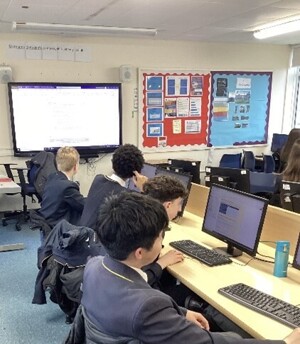Business
Business Studies at Samuel Ryder Academy aims to inspire students to understand the importance of enterprise and the nature of the business world. Students develop a broad and balanced perspective of business, as well as an inspiration for success and a passion to work hard in the community.
Students have access to a wide variety of digital technology to support the development and learning in the subject. Throughout the business curriculum students use their iPad as a digital backpack. All of the class resources used are accessible to them via their personal iPad. In addition to this, students also use a variety of different apps to help and support their progress and stretch their knowledge beyond the core curriculum.
Examples of student work:
Yr 9:


GCSE:


Sixth Form:


KS3
Year 9
Students are introduced to business and enterprise by completing a number of inter-related projects including the Cereal Challenge, trainer project and social enterprises. This involves students using the digital technologies, such as their iPad, to undertake research of existing markets, designing and then launching their own product. This work is then captured using OneNote and presentational software, with the support of frequent, high-quality teacher and peer feedback.
Topics include: Characteristics of an entrepreneur, Aims and objectives, Business Costs, Communication, Financial Documents, Functional areas, Marketing, ownership, location and stakeholders. This exciting breadth of topics ensure students develop their awareness of business as a social enterprise and how to have a positive impact on our local and national community while building a successful business. Through regular group work and presentations, students increase their confidence in their own oratory and leadership skills when solving novel problems. Teachers model and have expectations for students when using varied and specialised vocabulary, particularly highlighting the differences when students are speaking for a range of purposes e.g. to narrate, to analyse, to explain, to reflect and evaluate. Students increasingly listen with understanding and respond sensitively and appropriately to their peers throughout the course.
|
|
Autumn |
Spring |
Summer |
|
Year 9 |
Entrepreneurs, Business Ownership, Organisational Structure, Aims and Objectives, Market Research, Marketing |
Business Analysis, Corporate Social Responsibility, Franchises, Financial Analysis, Understanding Stakeholders |
Social Media Marketing, Business Creation and Planning, Pitching and Sales. |
KS4
KS4 Students study toward the Edexcel GCSE Business studies (1BS0). This subject equips students to solve the most complex and challenging problems within the business world by evaluating the current state-of-play and identifying a superior position by linking chains of reasoning. Through an optimistic and hopeful perspective of the future, students reflect on areas that can be improved and refining existing solutions. This is particularly seen through the exploration of alternative vehicle fuels as a possible solution to climate change.
We have a huge focus on both literacy and numeracy throughout the business studies course. A wide variety of resources involving texts, extracts and the internet are used to deliver engaging content. Students’ oracy and literacy skills are developed through the use of technical language when sharing ideas and articulating their responses to other students. Through oracy, teachers encourage formal language, use of keywords and full sentences to be used in extended written work in order to support literacy development as well as tackle longer answer examination questions. The digital technology is used to support students with developing these skills as students frequently practice their presentations with feedback being provided digitally.
We want our students to develop increasing confidence and competence in speaking and listening so that they are able to: clarify and express their ideas and explain their thinking. By adapting their speech to a wide range of circumstances including paired and group discussions and speaking to a larger audience, students increase their confidence in their presentational skills.
https://qualifications.pearson.com/en/qualifications/edexcel-gcses/business-2017.html (GCSE)
Theme 1 – Paper 1 (50%)
Theme 1 concentrates on the key business concepts, issues and skills involved in starting and running a small business. It provides a framework for students to explore core concepts through the lens of an entrepreneur setting up a business.
Theme 1 comprises five topic areas.
Topic 1.1 Enterprise and entrepreneurship – students are introduced to the dynamic nature of business in relation to how and why business ideas come about. They also explore the impact of risk and reward on business activity and the role of entrepreneurship.
Topic 1.2 Spotting a business opportunity – students explore how new and small businesses identify opportunities through understanding customer needs and conducting market research. They also focus on understanding the competition.
Topic 1.3 Putting a business idea into practice – this topic focuses on making a business idea happen through identifying aims and objectives and concentrating on the financial aspects.
Topic 1.4 Making the business effective – students explore a range of factors that impact on the success of the business, including location, the marketing mix and the business plan.
Topic 1.5 Understanding external influences on business – students are introduced to a range of factors, many of which are outside of the immediate control of the business, such as stakeholders, technology, legislation and the economy. Students explore how businesses respond to these influences.
Theme 2 – Paper 2 (50%)
Theme 2 examines how a business develops beyond the start-up phase. It focuses on the key business concepts, issues and decisions used to grow a business, with emphasis on aspects of marketing, operations, finance and human resources. Theme 2 also considers the impact of the wider world on the decisions a business makes as it grows.
Theme 2 comprises five topic areas.
Topic 2.1 Growing the business – students are introduced to methods of growth and how and why business aims and objectives change as businesses evolve. The impact of globalisation and the ethical and environmental questions facing businesses are explored.
Topic 2.2 Making marketing decisions – students explore how each element of the marketing mix is managed and used to inform and make business decisions in a competitive marketplace.
Topic 2.3 Making operational decisions – this topic focuses on meeting customer needs through the design, supply, quality and sales decisions a business makes.
Topic 2.4 Making financial decisions – students explore the tools a business has to support financial decision making, including ratio analysis and the use and limitation of a range of financial information.
Topic 2.5 Making human resource decisions – growing a business means that decisions relating to organisational structure, recruitment, training and motivation need to be made to influence business activity. These aspects are considered in this final topic.
The GCSE qualification gives students an understanding of business concepts, business terminology, business objectives, the integrated nature of business activity and the impact of business on individuals and wider society, preparing students to select as an A-Level option.
|
|
Autumn |
Spring |
Summer |
|
Year 10 |
1.1 Meeting Customer Needs, 1.2 The Market, 1.3 Marketing Mix and Strategy |
1.4 Managing People, 1.5 Entrepreneurs and Leaders, Corporate Social Responsibility Project |
2.1 Raising Finance, 2.2 Financial Planning |
|
Year 11 |
2.2 Financial Planning Continued, 2.3 Managing Finance, 2.4 Resource Management |
2.4 Resource Management Continued, 2.5 External Influences |
Exam Preparation and Revision |
Beyond GCSE
Students select between A-Level Business or BTEC level 3 National Extended Certificate in Business.
As well as developing key enterprise skills, business provides students with a detailed understanding of the workings of a business which remain as relevant today as they have ever been and will continue to remain so. Whether students have ambitions of working for a small local business, a global corporation, or indeed aspire to make their own success as an entrepreneur, the fundamentals of business are the same and as such it is a subject of interest and use to all.
Business studies will provide you with transferable skills such as: -
- Communication skills
- Using your initiative
- Analytics and numeracy skills
- Teamwork
- Leadership
- Decision Making
A-Level Units
Theme 1 – Marketing and People
Theme 2 – Managing business activities
Theme 3 – Business decisions and strategy
Theme 4 – Global business
BTEC Units
Unit 1 – Exploring business
Unit 2 – Developing a marketing campaign
Unit 3 – Personal and business finance
Unit 4 – Managing an Event
Unit 5 – International Business
Unit 6 – Principles of Management
Unit 8 – Recruitment and Selection Process
Unit 22 – Market Research
Wider Curriculum and Careers
Clubs
One club activity student participate in is the student investor challenge. Teams invest their virtual money in a set of stocks and other investment instruments where they create two portfolios:
- The Active Investor portfolio allows teams to trade every day.
- The Strategic Investor portfolio only allows a limited number of trades per month, encouraging long term thinking.
- Teams have a virtual £100,000 to invest in each portfolio.
At Key Stage 5, the business students will have the opportunity to participate in Young Enterprise, this involves students creating their own company: using their own funds they will create a product and begin its sale. The students will experience what it is like to run their own business with all the risk and reward that comes with that. Students will gain vital team working and decision-making skills whilst experiencing real world stakes.
Potential careers
- Accountancy
- Advertising
- Banking, investment and financial services
- General management
- HR/personnel
- Management consultancy
- Public relations
- Retail management
House Events
A touch-typing event is a competition or gathering where individuals demonstrate their proficiency in touch typing (a method of typing without needing to look at the keyboard). Participants are typically judged on their speed, accuracy, and technique. Touch typing is not just a basic skill; it's a fundamental tool that can positively impact various aspects of business operations, from efficiency and accuracy to employee health and professional image.
Trips and Visits
GCSE:
As of 2024 we offering a brand-new business residential trip to Business Live at Disneyland Paris. This trip immerses students in the practical applications of business principles at this world-famous theme park resort in a number of different and engaging ways. Students will attend a seminar hosted by facilitators with considerable experience of working with Disneyland Paris and featuring back-stage video interviews and footage filmed exclusively for Study Experiences. They will take part in our interactive Disneyland educational workshops in which students are encouraged to use their knowledge of business principles and practices. As well as these students get the opportunity to spend time within the Disneyland Paris Park.
Sixth Form:
Both Business course will attend a day trip to London during their course, this trip will allow students the opportunity so witness businesses in action. The content of these days directly relates to the courses the students undertake and aid in their wider knowledge.
Wider Reading
"Business Studies for Dummies" by Richard Pettinger: This book provides a comprehensive overview of business concepts, including management, marketing, finance, and operations. It's a great starting point for students new to the subject.
"GCSE Business Studies Complete Revision & Practice" by CGP Books: This revision guide covers all the key topics and includes practice questions and exam-style tasks to help students prepare for their GCSE exams.
"An Introduction to Business Ethics" by Joseph R. DesJardins and John J. McCall: This book introduces students to the ethical considerations and responsibilities of businesses, exploring topics such as corporate social responsibility and sustainability.
"Business Studies: A Comprehensive Introduction" by Dave Hall, Rob Jones, and Carlo Raffo: This textbook covers the core concepts of business studies, with real-world case studies and examples to illustrate key principles.
"Marketing: A Love Story: How to Matter to Your Customers" by Bernadette Jiwa: This book offers insights into marketing strategies and consumer behaviour, helping students understand the importance of customer-centric approaches in business.
"Accounting: An Introduction" by Eddie McLaney and Peter Atrill: An introductory textbook on accounting principles and practices, covering topics such as financial statements, budgeting, and taxation.
"Economics for Business" by John Sloman and Kevin Hinde: This book explores economic theory and its application to business decision-making, including topics such as supply and demand, market structures, and macroeconomic indicators.
Useful Links
https://senecalearning.com/en-GB/seneca-certified-resources/business-gcse-edexcel/
https://www.bbc.co.uk/bitesize/subjects/zpsvr82
https://qualifications.pearson.com/en/qualifications/edexcel-gcses/business-2017.html (GCSE)
https://qualifications.pearson.com/en/qualifications/edexcel-a-levels/business-2015.html (A-level)
https://qualifications.pearson.com/en/qualifications/btec-nationals/business-2016.html (BTEC)



























